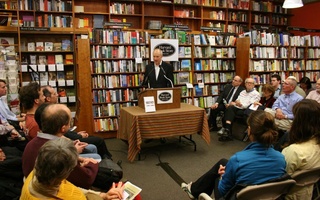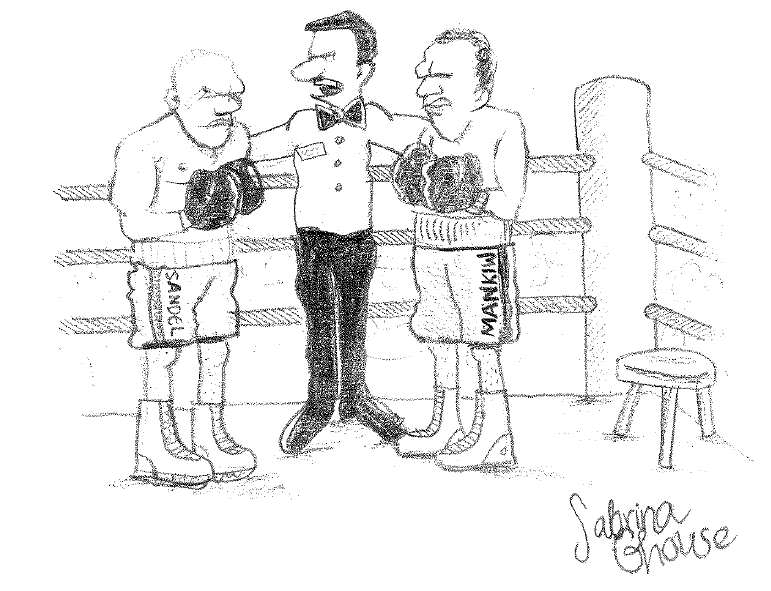Professor Michael J. Sandel is an ambitious man. In an op-ed in Prospect magazine last year, he said that “If I ruled the world, I would rewrite the economics textbooks,” which he thinks is “a small ambition, unworthy of [such a] sovereign office.” After competing with Professor Greg Mankiw for the largest class on campus for many years, it seems like the battleground has moved to textbook sales.
Professor Sandel’s objection to economics as a discipline comes from his discomfort at the marketization of public life. In his public lecture “The Perils of Thinking like an Economist” and his book “What Money Can’t Buy,” Sandel offers numerous examples of markets that challenge social norms. He claims that these markets, while innocuous in reasoning proposed by economics textbooks, create moral issues in two different ways. First, the expansion of markets causes injustice stemming from wealth inequality. In a world where kidneys can be sold and bought, for instance, wealth inequality could cause health resources to be allocated to the wealthiest rather than the neediest. Second, the formation of markets may alter the nature or character of the good being traded. Paying kids to read, for instance, changes their love for knowledge into love for money, which may deter kids from reading for fun. He blames economists for formalizing moral issues like these without consulting moral philosophy, and argues to reduce the role of markets in public life.
While I disagree with the moral contention in some of his examples, I agree that these arguments are valid criticism of the unconstrained market. His criticism is not, however, “a big step toward a more civic life” as he claims—because it is already in the very textbooks that he wants to replace.
Professor Sandel criticizes economists for applying efficiency arguments to buying and selling kidneys without thinking about its moral consequence. If Sandel cares to talk to any economist at the Harvard Faculty Club, he will find that his colleagues not only think about such moral complexities, but have also devised solutions. Instead of cash incentives, the “kidney exchange” will use an algorithm to swap donated kidneys, so that people who cannot receive donated kidneys from a loved one can still get a donated kidney from a stranger. This can improve efficiency of kidney donation based on the economic principle of coincidence of wants, but not in a morally contentious way. The study of markets without financial incentives became such an important subfield of economics that its intellectual godfather, Harvard economist Alvin E. Roth, received the Nobel Prize in Economics last year for this contribution. It is intriguing that in Sandel’s book about economists’ fixation with monetary markets, he forgets to include such alternative markets offered by mainstream economists.
More broadly speaking, economists are no strangers to difficult discussions about civic life. The great economists Kenneth J. Arrow and Amartya Sen founded the field of social choice theory, a mathematical formalism for making collective decisions with consideration of fairness, rights, liberties, and human folly. Of course, such ideas would not be included in Professor Sandel’s hypothetical textbook, because he dismisses the “rigor of natural sciences” in economics as deviant from the discipline’s origin as moral philosophy.
Since its conception, economics has come a long way from a normative political philosophy to a positive social science. David Ricardo and Alfred Marshall systemized the discipline with formal analysis. The introduction of statistical methods connected social theories with reality. Recently, economists have tentatively applied these toolkits to explain phenomena ranging from family life to social norms. With sufficient and reasonable assumptions, economists can answer difficult questions with a great dose of objectivity and rationality. Given the trajectory of economics to overtake spheres previously governed by moral philosophy, Professor Sandel is justified in questioning the role of a value-free science in public discourse.
His criticism, however, is not different from that of a weaver against the sewing machine. A value-free framework offers a platform for discussions driven by scientific consensus. Put simply, before deciding what a society should choose, people must agree on what society will do when given choices. Existing economics textbooks teach the latter, but Professor Sandel would prefer students to learn the former. Given that Sandel prefers to have students arrive at their own conclusion in his Justice class, it is not clear why he would prefer to teach students the moral limits of markets, rather than teach them how to think independently concerning such questions, with sound tools from economics.
In his attack on the field of economics, Professor Sandel caricatured the discipline as being narrowly focused on the cost-free transaction of a private good between two rational individuals, a conclusion that would not be surprising if he stopped reading an economics textbook after the first chapter. If Professor Sandel continued reading, he would find that economic thought gives great importance to social cost, as in environmental economics, or justice, as in social choice theory, or market irrationality, as in behavioral economics.
Professor Sandel’s book may offer insights about moral concerns in markets, but he chooses to ignore the comprehensive intellectual framework that already addresses his concerns. Instead of rewriting economics textbook altogether, Professor Sandel may make better use of his time picking up the economics textbook that he evidently forgot to finish reading.
Jonathan Z. Zhou ’14 is an applied mathematics concentrator in Eliot House. His column appears on alternate Wednesdays.
Read more in Opinion
The New Echo ChamberRecommended Articles
-
 Sandel Takes on ‘Right Thing’
Sandel Takes on ‘Right Thing’ -
Justice Goes GlobalThrough the aid of technology and of simultaneous translation, “Justice” students in three countries now debate ethical dilemmas in real time with each other.
-
Class Enrollments See FluctuationsWhen Sandel announced in his first lecture that the course would introduce a Friday class this year, roughly half of the 800 students went back to their shopping lists to look at other course offerings.
-
 'Justice' Diversifies Discussion Globally
'Justice' Diversifies Discussion Globally -
EdX Announces Spring 2013 CoursesEdX, the virtual learning initiative launched by Harvard and MIT last May, announced Wednesday that it will offer courses in the humanities and social sciences for the first time this coming spring.
-
Sandel Discusses Religion in Public LifeGovernment professor Michael J. Sandel and visiting professor Jean Bethke Elshtain discussed the role of religion in public life on Tuesday in front of a crowd of more than 500 students and community members in Sanders Theater.














